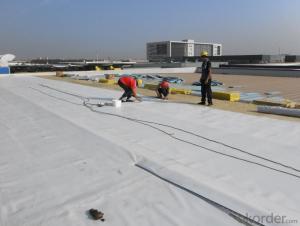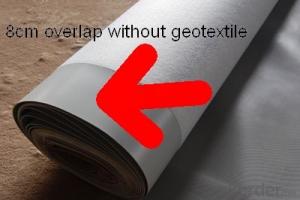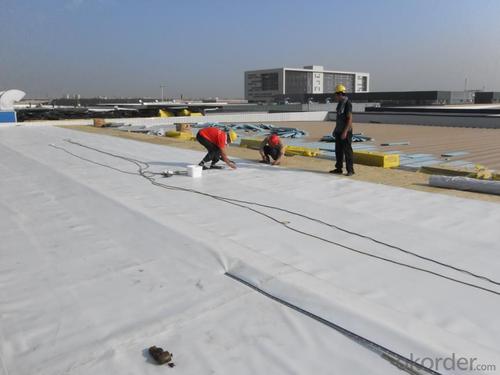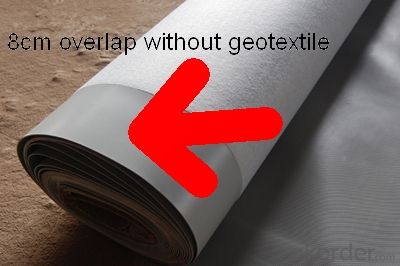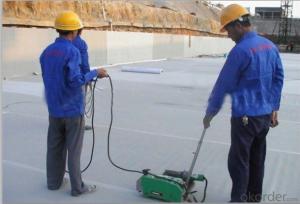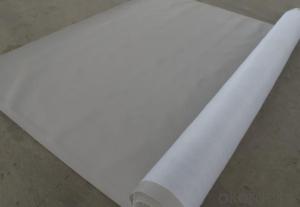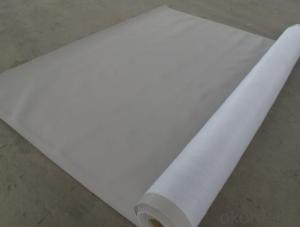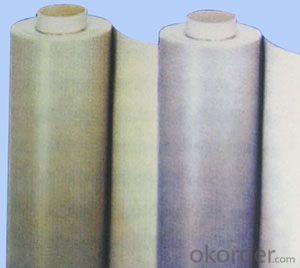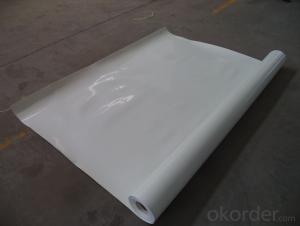PVC roof waterproof membrane reputable supplier
- Loading Port:
- Qingdao
- Payment Terms:
- TT OR LC
- Min Order Qty:
- 1000 m²
- Supply Capability:
- 600000 m²/month
OKorder Service Pledge
OKorder Financial Service
You Might Also Like
1. Introduction
Polyvinyl Chloride (PVC) waterproof membrane is a new polymer waterproof membrane which is
made from polyvinyl chloride resin, and mixed with plasticizer, filler, antioxygen, ultraviolet
absorber and other auxiliaries.
2. Specification
1) Size: 2.05(width)*20m (length)
2) Thickness: 1.2mm; 1.5mm; 2.0mm
3) Type: Homogeneous, Reinforced, With fabric back
4) Exposed and Non-exposed
5) Color: white, Grey or customized
6) Certificate: ISO9001/14001
3. Applications
1) All kinds of roofs, such as steel structure roof, planted roof etc.
2) Underground engineering, such as basement, subways, tunnels, air raid shelter, etc.
3) Other projects like artificial lake, dam, water reservoir, grain storehouse, etc.
4. Features
1) Excellent aging resistance.
2) Root resistant penetration, specially used on planting roof.
3) Welding installation. Joints are solid and environment friendly, no pollution.
4) High tensile strength, good elongation and dimensional stability.
5) Good plasticity, easy and suitable for details installation.
6) Fireproof. Fire extinguished out of the ignition resource.
7) Surface is smooth, no fading and dirty resistant.
- Q: Can a waterproofing membrane be used on brick surfaces?
- Yes, a waterproofing membrane can be used on brick surfaces. The membrane can be applied to protect the brick from moisture, water infiltration, and potential damage caused by water absorption.
- Q: Can a waterproofing membrane be used in boat decks or marinas?
- Yes, a waterproofing membrane can be used in boat decks or marinas. Boat decks and marinas are constantly exposed to water, making them prone to damage and deterioration over time. A waterproofing membrane can provide an effective solution to protect these surfaces from water intrusion, preventing issues such as rotting, warping, and mold growth. The membrane acts as a barrier, preventing water from seeping into the underlying structure and causing damage. It also helps to maintain the structural integrity of the boat deck or marina, prolonging its lifespan. Additionally, a waterproofing membrane can enhance the safety of these surfaces by reducing the risk of slip and fall accidents, as it can provide a slip-resistant surface. Overall, using a waterproofing membrane in boat decks or marinas is a wise choice to ensure their durability, longevity, and safety.
- Q: Can a waterproofing membrane be used for underground bunkers?
- Underground bunkers can utilize waterproofing membranes to great effect. Designed to establish a formidable defense against moisture, these membranes effectively thwart water infiltration into structures. This renders them an optimal solution for underground bunkers, which are susceptible to water encroachment due to their subterranean nature. By affixing a waterproofing membrane to the walls and floor of the bunker, it becomes possible to avert water seepage and maintain a dry interior. This is of paramount importance for safeguarding any stored items or occupants within the bunker. Moreover, waterproofing membranes offer additional advantages, such as insulation and protection against radon gas. It is crucial to select a membrane explicitly crafted for underground applications and capable of withstanding the unique conditions and pressures associated with subterranean environments.
- Q: Can a waterproofing membrane be used on below-grade structures, such as basements?
- Yes, a waterproofing membrane can be used on below-grade structures such as basements. In fact, it is highly recommended to install a waterproofing membrane on below-grade structures to prevent water infiltration and moisture problems. A waterproofing membrane acts as a barrier that prevents water from entering the basement walls and floors. It is typically made of materials such as bitumen, rubberized asphalt, or polyethylene, which are designed to be impermeable to water. The membrane is applied to the exterior or interior of the basement walls and floors, creating a watertight seal. This helps to eliminate the risk of water damage, mold growth, and structural issues caused by water penetration. Therefore, using a waterproofing membrane on below-grade structures like basements is essential to ensure a dry and safe living or storage space.
- Q: Can a waterproofing membrane be used on adobe block surfaces?
- Yes, a waterproofing membrane can be used on adobe block surfaces. Adobe blocks are made from a mixture of clay, sand, and straw, which can be susceptible to water damage. Applying a waterproofing membrane can help prevent water penetration and protect the adobe blocks from moisture-related issues such as cracking, erosion, or mold growth. It is important to ensure that the waterproofing membrane is compatible with adobe surfaces and follows the manufacturer's guidelines for application. Additionally, proper surface preparation and repair of any existing damage is crucial before applying the membrane to ensure its effectiveness.
- Q: Can a waterproofing membrane be used on tunnels with communication systems?
- Yes, a waterproofing membrane can be used on tunnels with communication systems. The membrane can help protect the communication systems from water damage and ensure their proper functioning.
- Q: Can waterproofing membranes be applied in cold weather?
- Yes, waterproofing membranes can be applied in cold weather. However, it is important to ensure that the manufacturer's instructions are followed regarding temperature limitations and proper installation techniques. Cold weather may affect the curing and adhesion process, so additional precautions and proper heating or insulation methods may be necessary during the application.
- Q: Can a waterproofing membrane be used as a vapor barrier?
- Indeed, a vapor barrier can be achieved by utilizing a waterproofing membrane. The main purpose of waterproofing membranes is to obstruct the flow of water across various surfaces, such as roofs or foundations. As a result of their water-repelling capabilities, these membranes simultaneously serve as vapor barriers, hindering the movement of water vapor. This serves to minimize the likelihood of condensation and other moisture-related problems within a structure. Nonetheless, it is crucial to acknowledge that not all waterproofing membranes possess the same degree of vapor resistance. Consequently, it is imperative to carefully select a waterproofing membrane that is explicitly designed to function as a vapor barrier, should this be a necessity for the intended application.
- Q: Can a waterproofing membrane be used for parking garages?
- Yes, a waterproofing membrane can be used for parking garages. Waterproofing membranes are commonly used in construction to prevent water infiltration and damage to structures. Given the potential exposure of parking garages to water from rainfall, snowmelt, or vehicle fluids, using a waterproofing membrane can help protect the structural integrity of the garage and extend its lifespan.
- Q: Can waterproofing membranes be used in wet areas like bathrooms?
- Waterproofing membranes are indeed suitable for wet areas such as bathrooms. It is strongly advised to utilize these membranes in bathroom spaces to prevent water damage and leaks. These membranes are specifically designed to form a barrier against moisture, guaranteeing that water does not infiltrate the bathroom's walls, floors, or other surfaces. By applying a waterproofing membrane, you can effectively safeguard the underlying structure from water damage, mold growth, and other issues caused by extended exposure to moisture. This is particularly crucial in wet areas like bathrooms where water is consistently present. Waterproofing membranes can be found in various forms, including sheet membranes, liquid membranes, and even pre-formed shower trays. They can be applied to walls, floors, shower enclosures, and other surfaces to create a tight seal against water. It is essential to correctly install and maintain the waterproofing membrane according to the manufacturer's guidelines to ensure its efficacy and durability. Therefore, if you are contemplating renovating or constructing a bathroom, it is highly recommended to use waterproofing membranes to guarantee a long-lasting and moisture-resistant space.
Send your message to us
PVC roof waterproof membrane reputable supplier
- Loading Port:
- Qingdao
- Payment Terms:
- TT OR LC
- Min Order Qty:
- 1000 m²
- Supply Capability:
- 600000 m²/month
OKorder Service Pledge
OKorder Financial Service
Similar products
Hot products
Hot Searches
Related keywords
